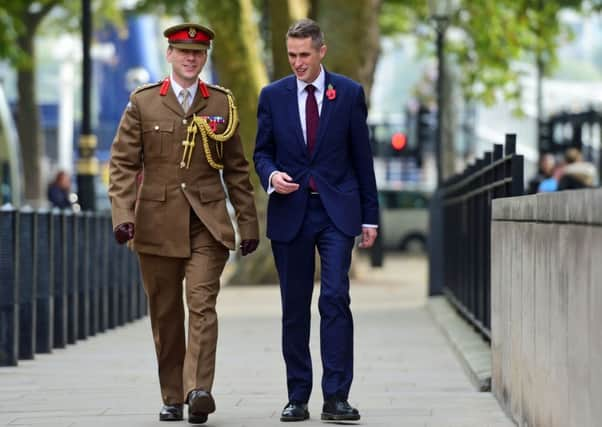Andrew Vine: Behind the fanfare, cuts are sinking our military


When the giant new aircraft carrier HMS Queen Elizabeth is formally commissioned into the Royal Navy on Thursday by the sovereign after whom she is named, all will be pomp and ceremony. Hearts are likely to stir at the raising of the White Ensign before the £3bn carrier sails from Portsmouth and the ship takes her place in the grand British naval tradition.
But the ceremony represents a kind of charade, because the cheering and the playing of Rule Britannia cannot obscure the fact that this country’s defences are in a mess, which is a damning indictment of the Government. Just how big a mess will be underlined this afternoon, when some very distinguished retired soldiers give evidence to the Defence Select Committee about proposals for cuts to the Royal Marines and their ability to launch assaults from the sea.
Advertisement
Hide AdAdvertisement
Hide AdAmong them is Major-General Julian Thompson, who speaks with absolute authority on the subject having commanded the British forces which charged ashore on the Falkland Islands in 1982. He, like many senior officers past and present, has been sharply critical of the possible cuts, but they are only the tip of the iceberg.
Defence has been chronically underfunded for decades, but the current Government is presiding over a running-down of the services that threatens to leave them unable to fight effectively. And in doing so, the Government neglects its primary duty, the defence of the realm.
The rot has been setting in for decades. General Thompson will recall all too clearly that 35 years ago, defence cuts meant the Royal Navy had insufficient ships to get troops and equipment to the Falklands to recapture them from Argentinian invaders, leaving no option but to charter merchant vessels.
More recently in Iraq, penny-pinching cost British lives because troops did not have enough body armour to go round, and were compelled to patrol in woefully unprotected Land Rovers lethally vulnerable to roadside bombs.
Advertisement
Hide AdAdvertisement
Hide AdThe penny-pinching continues. Ironically enough, it was on a visit to British troops in Iraq last week that the Prime Minister was asked about concerns over defence funding, questions to which she gave no straight answer.
In common with both Conservative and Labour predecessors, Theresa May is adept at the familiar politician’s trick of waxing lyrical about our Armed Forces, how brave they are and how deeply the country respects them.
All unquestionably true, yet the reality does not match her rhetoric. Soldiers, sailors and air force personnel housed in accommodation that would shame a sink estate, or handed redundancy notices after completing a tour of duty, do not feel they are either respected or valued.
Nor do Royal Marines, facing a 15 per cent cut in their numbers. Or the Army, which has shrunk to 78,000 personnel – well below its target strength of 82,000 – and is now facing being cut to 70,000.
Advertisement
Hide AdAdvertisement
Hide AdAgainst such a backdrop, the fanfares over HMS Queen Elizabeth have a hollow ring to them.
Amid the hullaballoo surrounding Brexit, the Prime Minister might imagine that defence was a secondary issue, but she’d be wrong. Disquiet over cuts is not only confined to the services, but is growing within her own ranks. A rebellion is brewing that could imperil the Government’s slender majority, with Defence Minister Tobias Ellwood letting it be known he will resign rather than impose cuts, and backbenchers threatening to cause trouble. That makes the internal politics of the Conservatives even trickier than it already is, but it’s more fundamental than that.
The value that Britain places on its Armed Forces is inseparable from our country’s stature and role in the world after we leave the EU. Abandoning our traditional strength in defence makes us appear not a force to be reckoned with in economic as well as military terms, but a small island of diminished influence off the coast of Europe.
It is about our credibility as a leading member of Nato, our ability to make a significant contribution to international operations rather than just being a token presence, and also central to the long-standing policy of being strong enough to act as a deterrent to potential aggressors.
Advertisement
Hide AdAdvertisement
Hide AdThere is absolutely no point in being one of the handful of democratic states to maintain a nuclear capability if the rest of our forces are too weak to challenge aggression. And in an ever-more dangerous world of unpredictable threats from rogue states, running down our Armed Forces is folly.
The Government not only needs to abandon any thought of further defence cuts, but start giving the services the resources they need, as well as the respect they deserve. Keeping our country safe should be a priority, not an afterthought.